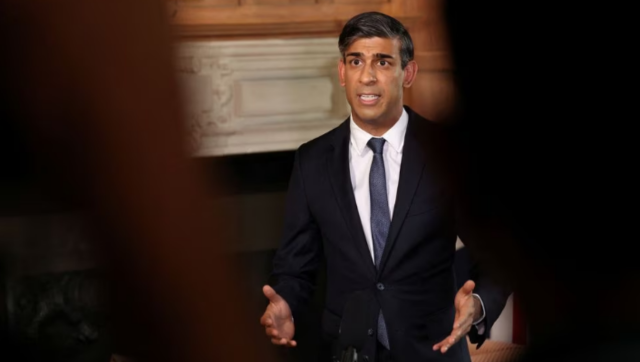UK Prime Minister Rishi Sunak on Tuesday will strive to avoid a potential setback for his recent initiative to relocate migrants to Rwanda, a move that has caused divisions within his ruling Conservative party. Sunak’s response to a unanimous Supreme Court ruling last month, which deemed the deportation of asylum seekers to Rwanda illegal under international law, is embodied in the Safety of Rwanda (Asylum and Immigration) Bill. The bill aims to address the court’s concerns through legislation, forming part of the government’s broader effort to curtail both regular and irregular immigration, a critical issue likely to feature prominently in the upcoming election. However, Sunak’s attempt to declare Rwanda as a safe destination, despite reservations from human rights monitors, and to eliminate legal challenges to deportation orders has ignited significant internal strife within the Conservative party. This internal conflict mirrors the disagreements seen during the debates over the form Brexit should take. While hardline right-wing members argue that the proposals lack sufficient toughness, more liberal Tories worry that amendments down the line could lead the UK to violate international law. The parliamentary debate is scheduled to commence around 12:30 GMT, with a vote anticipated at 19:00 GMT. The focus will be on votes against and abstentions, marking a pivotal test of Sunak’s leadership. A defeat would not only be unprecedented at such an early stage in the parliamentary process since 1986 but also a blow to Sunak’s authority, just over a year since assuming leadership of the Tory party. In response to the potential defeat, opposition Labour leader Keir Starmer suggested that Sunak should call for a general election, but he expressed confidence that the bill would pass. Despite trailing behind the Labour party in polls, Sunak has prioritized controlling immigration as a key policy. In an effort to placate opponents, he hosted a breakfast meeting at Downing Street on Tuesday to persuade potential rebels to support the bill or risk its failure at the outset. “Take back control” was a rallying cry for Brexit supporters like Sunak during the 2016 referendum. However, governing UK borders after leaving the European Union has proven to be a more challenging reality for Tory governments. The UK-Rwanda deportation plan, initially announced by Sunak’s predecessor Boris Johnson last year, was intended as a response to the rising numbers of migrants crossing the Channel from France in small boats. The UK-Rwanda deportation plan was first announced by Sunak’s successor Boris Johnson last year as a way of dealing with increasing numbers of migrants crossing the Channel from France in small boats. Starmer called the policy, which has already seen the UK pay Rwanda some £240 million ($300 million), a “perfect example” of the “cultural stain that runs through the modern Conservative Party”. “Not a single person has been sent and even if we did send people, we would pay for their hotels and upkeep. “And we’d have to resettle refugees from Rwanda in exchange. That’s the deal that they are voting on today,” AFP quoted Starmer as saying. Net migration - the difference between the number of people arriving and those leaving – stood at a record 750,000 last year. Sunak’s government has since announced plans including higher minimum salaries for economic migrants, and restrictions on accompanying family to cut numbers, prompting widespread criticism. But it also wants to cut asylum applications due to a backlog of cases from “small boats” crossings, blaming them for adding pressure and an estimated £8 million-a-day cost on public services. With inputs from agencies
UK Prime Minister Rishi Sunak on Tuesday will strive to avoid a potential setback for his recent initiative to relocate migrants to Rwanda, a move that has caused divisions within his ruling Conservative party
Advertisement
End of Article


)

)
)
)
)
)
)
)
)



